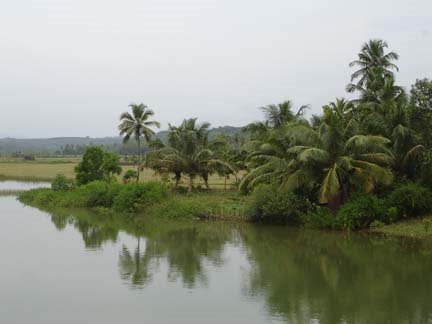Antonios Vasileiadis, a scholar from Athens, Greece shares the opinion that many of our words have been borrowed or imported from Mediterranean, Africa regions along with immigrants.
He conveyed the following comments (under the post 77 in this blog).
“The Kodavas explain that by saying "Poly-poly Deva" ask Gods for " more or many more" and is the exact meaning the Greek word" Poly" has. You use it today when you say Polytechnic or Polyclinic. South Indian languages have given a lot of help to lost Mediterannean word's meanings. We were puzzled what the word Korymbas ( of the people present at God Zeus birth) was meaning. Finally I figured out that Korumbas in South Indian languages means "SHEPHERDS".Well with the tradition were shepherds are present at the birth of every miraculously born and then tortured,killed and resurrected God. For you Sheep is " kuri ' for the ancient Greeks it is "kura ".
As I ended a paper presented at the 2007 Indian and South Indian History Congress -
we are more close related than what we think. “
Inna
To the list of imported /immigrant derived Tulu words discussed in earlier posts I would like to add Inna. The word Inna has a distinct place in Tulu language, even though we may have forgotten what it exactly means. I stress the word forgotten because we do not find easy explanation to its meaning. For example, our Tulu Nighantu does not carry an entry or clues to the possible meaning to this word : Inna.
At least three villages in the Tulunadu namely Inna, Innanje and Innoli have preserved this word 'Inna' as fossil toponyms of our forgotten heritage.
The name 'Inna' survives in Central Asia and Europe as a feminine proper name. The word Inna in Russian languages means rough water and thus the word possibly represents a wild river. This meaning seems appropriate because all our Inna-villages (Inna, Innanje, Innoli) are located proximal to rivers.
Origin
Migration of human tribes on continental scale along the path of history is a reality considering the distribution pattern of genetic features and characteristics. The word 'Inna' must be one of the ancient words brought by the migrating people from Mediterranean -Mid-Asia region to Karavali region during course of early history. Thus human tribal settlements near the wild rivers were named 'Inna' with or without village-indicator suffixes.
®
Subscribe to:
Post Comments (Atom)
Blog Archive
Books for Reference
- A Comparative Study of Tulu Dialects By Dr. Padmanabha Kekunnaya. Govinda Pai Reserach Centre, UDupi. 1994
- Koti Chennaya: Janapadiya Adhyayana. By Dr. Vamana Nandavar. Hemanshu Prakashana ,Mangalore.2001.
- Male kudiyaru. Dr B. A.Viveka Rai and D.Yadupathi Gowda, Mangalore University,1996.
- Mogaveera Samskriti By Venkataraja Punimchattaya. Karnataka Sahitya Academy.1993.
- Mugeraru:Jananga Janapada Adhyayana. By Dr Abhaya Kumar Kaukradi.Kannada & Culture Directorate,Bangalore & Karnataka Tulu Academy, Mangalore,1997.
- Puttubalakeya Pad-danagalu. Ed: Dr B.A.Viveka Rai,Yadupati Gowda and Rajashri, Sri Dharmasthala Manjunatheswara Tulu Peeta. Mangalore University.2004
- Se'erige. Ed:Dr K.Chinnapa Gowda.Madipu Prakashana,Mangalagangotri,2000.
- Studies in Tuluva History and Culture.by Dr P Gururaja Bhat (1975).Milagres College,Kallinapur,Udupi.
- Taulava Sanskriti by Dr.B.A.Viveka Rai, Sahyadri Prakashana,Mysore 1977
- TuLu naaDu-nuDi By Dr.PalthaDi Ramakrishna Achar, Puttur.
- TuLu NighanTu. (Editor in Chief: Dr U.P.Upadhyaya, Govinda Pai Research Centre,Udupi. Six volumes. 1988 to 1997
- Tulu Patero-A Philology & Grammar of Tulu Language by Budhananda Shivalli.2004.Mandira Prakashana Mangalore. p.317. (The book is in Tulu Language using Kannada script)
- TuLunadina ShasanagaLa Sanskritika Adhyayana. By Shaila T. Verma (2002) Jnanodaya Prakashana,Bangalore, p.304.(Kannada)
- Tuluvala Baliyendre. Compiled by N.A.Sheenappa Hegde,Polali,Sri Devi Prakashana,Parkala,1929/1999
* Landscape images *
A Coastal estuary

Holegadde near Honavar,Uttara Kannada dist, Karnataka
Copy? Right - but kindly remember to acknowledge!
" tulu-research.blogspot." ತುಳು ರಿಸರ್ಚ್. ಬ್ಲಾಗ್ಸ್ಪಾಟ್. ಇನ್

Have a nice day !

H Viswanath adds comments relating to alternate possibilities of the word Inna:
ReplyDelete"Inna: This refers to a sensitive tree, bark of which is used in bathing. So 'Inna' can also be explained a place with grove of inna trees. Source: Google search for 'Comparartive Dravidian words Dictionary'. Will give so many web pages. Read : Wiki. Dravidian languages wherein see External link: 'Dravidian Etymological Dictionary'. It is searchable online form, wherein you will find 6 entries for 'inna'. If you search for 'Tamil Inna' , you will find names two Post- Sangam Anthologies, named 'Inna Naarpathu' and 'Iniyavai Naarpathu' by Kabilar. It is a collection of poems on code of conducts for leading a happy life. One of the meanings of 'inna' in Tamil is 'one that gives happiness'."